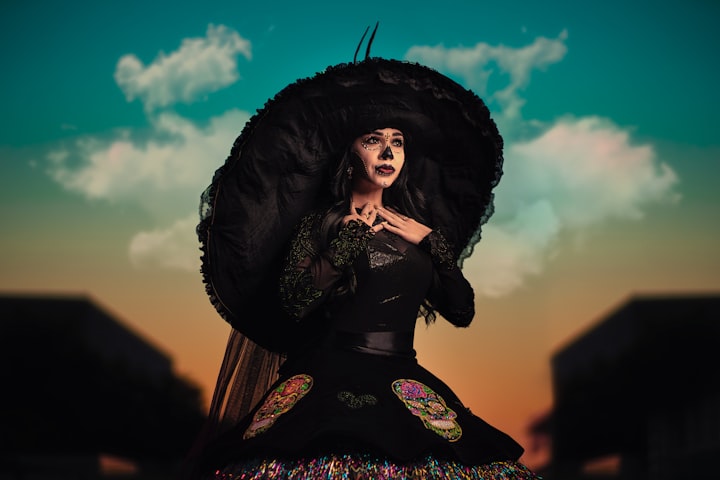
His grandmother was in no mood to be respected, despite her children and friends gathering at her bedside to do just that: pay their respects to her. In the main, she preferred to be left to herself, to lie in her bed, suffering from the effects of age, in decline, but this wish, her familia could not grant her.
Three generations shared this modest home. One would not find this village listed in the federal Pueblos Mágicos initiative, yet to the ten-year-old, it was magical, this community. The boy knew of nowhere else, and the stories his father told him, of working in the mines, made them not the grueling everyday labor of grown men in dangerous conditions, but an adventure saga.
He was ten. His beloved grandmother, Itziar, was leaving him, one painful degree at a time.
“Lalo,” his mother exhorted him, “come, sit closer to your abuela.” He knew: she must have been tired, too — she generally called him Eduardo, his given name, rather than the diminutive that he, his father and brothers and most other people seemed to prefer to voice in his direction. “Mama,” she said to the sleeping crone, “here is your chico especial.” He disliked being herded to his grandmother’s side, but got over it as soon as he rested a hand upon hers, which triggered a reaction in her: her eyes opened, just enough to spy him, and she smiled weakly.
Plácida, his mother, called over her shoulder, to Lalo’s father, “Néstor? Where is Lucho? I sent him to find Padre —”
“He is here,” replied her husband. Néstor stood in the doorway to his mother-in-law’s room, stepping aside to reveal a wizened priest standing just behind him. A gangly boy in his middle teens, the aforementioned Lucho, bounding up the steps to the family’s house, caught himself before he ran into either a man of the cloth, or the man of the house: his father, and Lalo’s. “Stand up, Eduardo,” the latter snapped, out of habit, at his kneeling youngest. He had had to recall the boy’s given name, so seldom did he use it.
The former, Miguel, favored Lalo, with feigned surprise. “I was named after no less than Don Miguel himself,” the priest exclaimed, with his bright smile, that reddened his cheeks, “and he was no less than the Father of our Nation! How did you get your name?”
Lalo’s cheeks burned. He pointed at his grandmother, which was an answer — his name had been her suggestion, to her daughter. Placida took the withered hand of her mother in both of hers, and prayed under her breath, as the padre began the Last Rites.
Lalo did not comprehend the finality of this ritual, but he grasped its severity. Other adults began to filter into the room. It was late afternoon, almost dusk. A heat seemed to press down upon each person, like a cloth that was soaked with heated water. Even his stalwart big brother appeared to vanish behind, or in front of, taller adults. Lalo found the murmurs of prayer both soothing and unsettling. What were they saying to God? What was He saying back to them? What did his abuela — his grandmother — want him to do?
^^^^
The Institutional Revolutionary Party, or PRI, had reigned over the nation, since 1920, but the Party of the Democratic Revolution, or PRD, won their nation’s presidency at last in the previous year, which was numbered 2000. Itziar had joked that it was the shock, of a new party coming into power in Mexico, that had caused her collapse, but only her son-in-law, Néstor, had laughed.
Lalo had seen older people wearing political buttons and carrying placards, handing out a fistful of leaflets, and the like, but he neither understood, nor cared, about a mere election involving mere adults. He wanted to be with his family, who were adults, except for Lucho, and he did not count that against them, even when they crowded him out of the bedroom, out of the house —
A young woman stood at the bottom of the stairs, smiling up at him. “Come with me, Lalo,” she said, and she reached out her hand to touch him, as he walked, or rather, drifted down the stairs. The house was pregnant with a host of adults — many of whom he did not know by their names.
Nor did he know the name of this beguiling stranger. “We need to give your abuela a chance,” she said, smiling with a power that took his breath away. She stepped out of the stairwell, into the direct sun, assured of Lalo’s full cooperation in this motion. She glanced both ways down the street. “That way, I think. We will find a shady spot.”
“What is your name?” he remembered to ask her, as they walked away from him house. Plácida and Néstor could be overheard trying to calm down the weeping neighbor girl, who had brought flowers and condolences from her nearby apartment. “Do you work with my father? Do you know my mother and my abuela?”
She smiled again; it was a radiant sight. “Zaray,” she said, and it took him a moment to realize she had answered his question. An old couple passed on the street, then a young man in his early twenties; he waved at Lalo, but he seemed to be ignoring Zaray altogether, which was quite odd. She was the chica muy hermoso, all right; Lalo thought she would make a nice friend for Lucho, not realizing that she looked maybe a decade older than Lucho was. “You could say… I have always wanted to meet them. I am so pleased that I get to give Itziar my time, and my help.”
They reached a grassy spot, and Zaray chose to lean against a tree and let it shade the summer sun beating down on her reddish-brown hair. For his part, Lalo plopped down beside her. It was getting cooler, but not fast enough; he was starting to perspire. “Did you ask my mama and papa to bring me here?”
Zaray looked down at him. She had to suppress an enchanted smile, at this serious inquiry. “Lalo… I am helping them, too. Just as I am helping Lucho, and even you, today. Your abuela, she wants to go on an adventure, but she feels so bad. She cannot just rise from her bed, and step outside — as we just did.”
“You were in our house?” Lalo asked. He did not recall having seen her earlier. “I wanted to see everyone who came to be nice to us.”
^^^^
“¡Sí, lo estaba!” she laughed, as if divulging a favorite prank to a trusted friend. “I told you, I came to help her, but I could not help her, as long as you were in the house. If you had been there… she would not have welcomed my help.” A beat elapsed. She glanced away, as if trying to hear something in the distance. Lalo just reflected, again, how he didn’t like it when adults said strange things to him, without explaining what they meant.
“I better go home,” he said at last. “Mama will ask where I had been, and Papa will frown at me.”
She nodded, after another beat, as if agreeing with him, but not with him. “It is time,” she said. “Your abuela has left, for, well — her adventure.” She pushed herself away from the tree, and took her time walking back toward his home.
Lalo ran to catch up with her. “Do you think she was mad at me, for not being there? My abuela is always saying she wants me to be with her.”
“Of course she did,” said Zaray, exercising much patience. “Don’t you think she would cancel her plans, and stay home, if her chico especial were in the room?”
They had almost reached the stairwell, when Zaray stopped short of walking up them. “I have to be going now, Eduardo,” she said, brushing his hair back, behind one ear. “Your abuela and I have so much to do.”
“Will you come back?” Lalo asked her, suddenly enthusiastic — and sad, at the same time. “To play with me, and Lucho? Will you come back, Zaray?”
She tossed him one last smile, this one a bit sadder than others she had worn. “I will, indeed. But you may not remember me.” Zaray stepped out into direct sun, and he turned away from the street. Plácida found him then, embracing her youngest child with painful strength.
Lalo walked back upstairs to a room filled with grieving people, some of them noisy, others stiff and muted. Nobody seemed to have noticed his absence, and none of them could remember having met anyone named Zaray. He sat beside Itziar for a long time, holding her hand in both of his own. His abuela seemed to be smiling.
© Eric Wolf 2022.
About the Creator
Eric Wolf
Ink-slinger. Photo-grapher. Earth-ling. These are Stories of the Fantastic and the Mundane. Space, time, superheroes and shapeshifters. 'Wolf' thumbnail: https://unsplash.com/@marcojodoin.






Comments
There are no comments for this story
Be the first to respond and start the conversation.